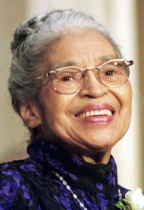Today is Martin Luther King Jr‘s actual birthday January 15th 1929. The official holiday is this Monday January 20th..Its also the same day President Obama is inaugurated. We wanted to offer up a few pieces to help you remember, inspire and get you through the day….
First up is a nice video that pays tribute to Bloody Sunday.. That was on March 7 1965 when Dr King and about 600 Civil Rights marchers attempted to walk from Selma to Montgomery, Alabama. When they came to cross the Edmund Pettus Bridge, they were met with a line of police and bully clubs.. many of the marchers were badly beaten.. This song captures the moment
http://www.youtube.com/watch?v=a115XUCoq_g
Next is a clip from a speech in King’s later years where he talks about Black empowerment and the vicious lies we were told about Black inferiority…
https://www.youtube.com/watch?v=UGtjAaJeUWY
 Next is the speech that many speculate led to King being killed. It was the historic speech where he talks about why he opposed the War in Vietnam.. It was a compelling speech where he goes in on the US and her policy of military violence. He also talks about the intense poverty here in the country.
Next is the speech that many speculate led to King being killed. It was the historic speech where he talks about why he opposed the War in Vietnam.. It was a compelling speech where he goes in on the US and her policy of military violence. He also talks about the intense poverty here in the country.
What many folks don’t like talking about is how shortly after the speech major newspapers from all over the country vilified King. They accused him of being unpatriotic. Not only did he lose support amongst the mainstream, he also lost a lot of popularity amongst other Blacks and Civil Rights leaders. Many felt that he stepped out of his lane and that by speaking on the war, it would mess up their funding. You don’t hear too many people apologizing years later for dissing King and abandoning him for speaking out against the war.
http://www.youtube.com/watch?v=b80Bsw0UG-U
Here’s part 1 of a cool in depth interview as he was just starting out in the Civil Rights Movement… The historic Montgomery Bus Boycott was under his belt.. Here on a show called the Open Mind, King talks about the ‘New Negro’
https://www.youtube.com/watch?v=-Ll4QmvnGcU
You can peep pt 2 of this interview HERE
This was a piece I put together a couple of years ago to pay tribute to the Oscar Grant Movement… We were all waiting eagerly for the verdict to the trial around the police who killed him.. Was moved to juxtapose King’s last speech with all that had been going leading up to the jury’s decision..
https://www.youtube.com/watch?v=gMgccsq1IyM
Returned to Davey D’s Hip Hop Corner

















 About this Jay Z / Harry Belafonte thing..One of the ways people look at this scenario is by noting that if the community supports a celebratory/ entertainer, that celebratory/ entertainer should ideally support the community… Hence when Jay Z remarked that his presence is charity feel like it’s a lopsided equation because in reality our collective presence in the form of concert tickets, albums sales and clothing purchases is what puts Jigga on the social and financial map.
About this Jay Z / Harry Belafonte thing..One of the ways people look at this scenario is by noting that if the community supports a celebratory/ entertainer, that celebratory/ entertainer should ideally support the community… Hence when Jay Z remarked that his presence is charity feel like it’s a lopsided equation because in reality our collective presence in the form of concert tickets, albums sales and clothing purchases is what puts Jigga on the social and financial map.

 The Voting Rights Act, first signed into law in 1965, was a keystone victory of the civil rights movement. African-American citizens withstood beatings, fire hoses and dogs to see the law passed. Some even gave their lives.
The Voting Rights Act, first signed into law in 1965, was a keystone victory of the civil rights movement. African-American citizens withstood beatings, fire hoses and dogs to see the law passed. Some even gave their lives.
 Today is
Today is 
 It’s always a pleasure to chop it up with author, former Black Panther and political prisoner
It’s always a pleasure to chop it up with author, former Black Panther and political prisoner  Dhoruba talked about the rise of a police state where the stripping of constitutional rights would seem normal to a beleaguered population. He also talked about what sort of things we could expect slave ascends to the slave masters house including increased oppression not just from outside forces angry at a Blackening and Browning America, but also from President Obama himself and interests he represents. Dhoruba notes that Obama is part of a larger scenario (the American Empire) where Black faces are used to get the masses to buy back into an imperialistic system versus oppose it..
Dhoruba talked about the rise of a police state where the stripping of constitutional rights would seem normal to a beleaguered population. He also talked about what sort of things we could expect slave ascends to the slave masters house including increased oppression not just from outside forces angry at a Blackening and Browning America, but also from President Obama himself and interests he represents. Dhoruba notes that Obama is part of a larger scenario (the American Empire) where Black faces are used to get the masses to buy back into an imperialistic system versus oppose it..